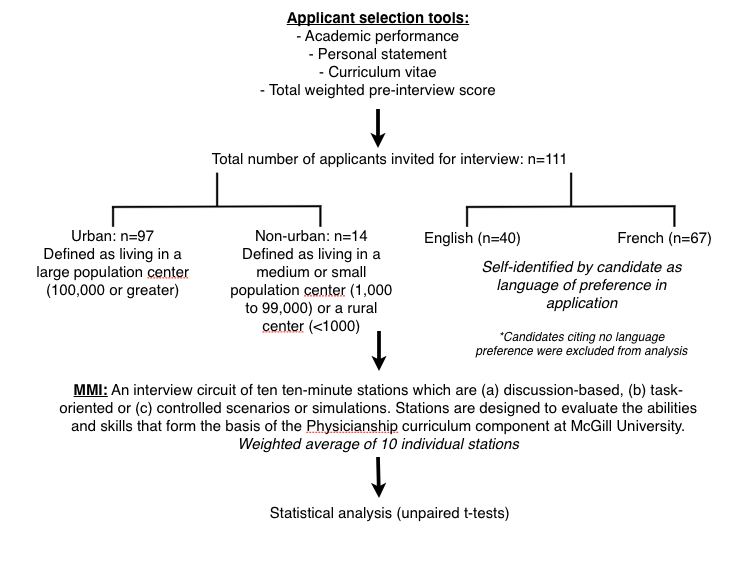
|
Authors | Institution |
|
Andrea Kessous M.D. Saleem Razack M.D. |
McGill University - Faculty of Medicine |
 |
|
||||||
| Bilingual Multiple Mini-Interviews: Equivalent performance of English vs. French and urban vs. non-urban candidates |
- McGill University uses bilingual (English-French) multiple mini-interviews (MMIs) to evaluate candidates for admission to medical school and has a mission to serve a broad constituency, including urban and non-urban communities
- Given many studies indicating the underrepresentation and difficult access for non-urban candidates to medical school, we compared interview performance between urban and non-urban candidates.
- We also used our unique bilingual assessment environment to compare interview performance in English vs. French.
Relevant definitions:
Urban: Self-reported primary residence in an urban population center (<100,000)
Non-urban: Self-reported primary residence in a sub-urban population center (99,999-1000) or a rural population center (<1000)

| Urban vs. non-urban | English vs. French | |
| Academic performance | p= 0.72 | - |
| Personal statement | p=0.09 | - |
| Curriculum vitae | p=0.88 | - |
| Total weighted pre-interview score | p=0.01 | - |
| MMI Performance | p=0.51 | p=0.23 |
- Candidates invited to interview showed equivalent performance based upon self-reported urban and non-urban status. These data are different from other reported studies, in which urban/non-urban performance differences were demonstrated
- It is possible to create an equivalent bilingual multiple mini-interview which does not bias applicants interviewing in either language
1. Medical school candidates from urban and non-urban backgrounds who are successful at being invited to interview perform equivalently on McGill’s MMI’s .
2. Medical school candidates interviewing in English perform equivalently to those interviewing in French on Mcgill’s MMI’s.
3. An equivalent bilingual MMI is possible, allowing us to evaluate candidates in their language of choice.
4. Further MMI research should include rich descriptions of context, in order to understand the factors that may be contributing to the differences between our observations and those of other researchers with respect to the performance differences of urban/non-urban candidates.
This study has been approved by the Research Ethics Board of the Faculty of Medicine of McGill University.
The authors would like to thank the Office of Admissions, Equity and Diversity at the Faculty of Medicine of McGill University for providing the data necessary to complete our study. The authors are also grateful to the Faculty of Medicine's Student Affairs Office for research funding.
Dhalla IA, Kwong JC, Streiner DL, Baddour RE, Waddell AE, Johnson IL. Characteristics of first-year students in Canadian medical schools. CMAJ 2002;166(8):1029–35.
Hensel JM, Shandling M, Redelmeier DA. Rural medical students at urban medical schools: Too few and far between? Open Med. 2007 Apr 14;1(1):e13-7.
Pau A et. al. The Multiple Mini-Interview (MMI) for student selection in health professionals training - a systematic review. Med Teach. 2013 Dec;35(12):1027-41.
Raghavan M et. al. Multiple mini-interview scores of medical school applicants with and without rural attributes. Rural Remote Health. 2013 Apr-Jun;13(2):2362.
 Send Email
Send Email
